Today’s post is brought to you in partnership with my friends at EverlyWell! We’re chatting all about my food sensitivity test results and what they mean.
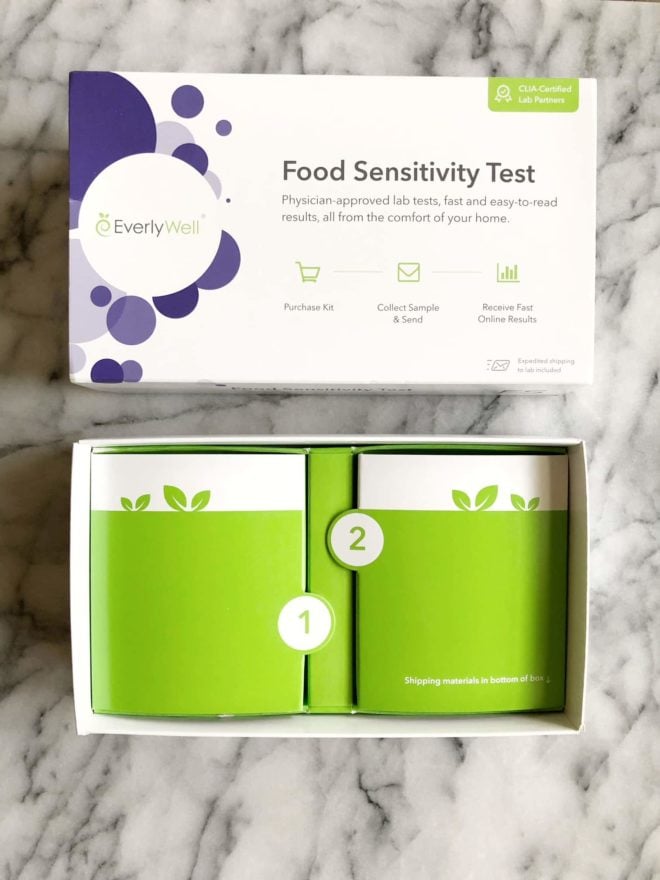
Table of Contents
After posting about EverlyWell’s Food Sensitivity test recently, I decided to take the plunge and test myself. The results totally surprised me! I get a ton of questions about food sensitivities – how to know if you have one, the difference between sensitivities and allergies, and how to get tested. In the past, I recommended that people work with a naturopath or functional medicine doctor to get food sensitivity testing done, but now great companies like EverlyWell allow you to do a simple test at home and receive your doctor-reviewed results online. This significantly reduces the cost of testing, and is much less intimidating than starting a month-long elimination diet and gradually adding foods back in to see how they affect you. EverlyWell’s Food Sensitivity test measures the levels of IgG antibodies in your blood to 96 different foods and allows you to see if you have no, low, medium, or high reactivity to those foods. Results should be used to guide an elimination diet with add back challenge to accurately identify symptom provoking foods.
If you are experiencing digestive issues, joint pain, eczema, breakouts, or even fatigue that won’t seem to lift despite your best efforts, food sensitivity testing is a great place to begin your detective work. By finding and eliminating your food intolerances, you can reduce overall inflammation and begin to heal your symptoms. However, food sensitivity testing isn’t always the end all be all! If you haven’t eaten a food within 4 weeks of taking the test, your sensitivity may not show up on testing. So, if you’ve been on an elimination diet for a while, this is not a good way to determine whether to add foods back in. Also, if you are dealing with leaky gut syndrome, your immune system may be making antibodies to a lot of the food you’re eating, because with leaky gut, proteins specific to different foods will react with your body via a compromised intestinal barrier …interacting with your blood stream, where they shouldn’t be. This can result in sensitivities showing up on your testing that aren’t “true sensitivities.” For more information on this you can read our previous post on food sensitivity testing here!
The Process
The process is really simple and, to be honest, I put it off because I thought it would be *more* complicated than it turned out! The testing kit they send you really holds your hand throughout the ENTIRE process. First, you’ll create a profile online and register the individual code on your box. This way, the results will ping your account when they’re ready. After this, you will need to prick your finger and pool just enough blood to fill (at least) three dots on the collection card.
Pro-tip: follow their instructions to a T. Make sure you drink an extra glass of water and let the blood drain to your fingertips. I did NOT follow these tips and had to use all 3 lancets to prick 3 different fingers to get enough blood.
After you’ve dotted your card, it gets sealed back up in the very same box they sent you! A handy bag with shipping label is already included (under the cardboard insert). Drop that at your local courier and wait for your email!
EverlyWell’s testing labs are CLIA certified and the test results are independently validated by a doctor in your state. Your test results will be ready in as little as 5 days, then you’ll receive an email when they’re ready. Then you simply log in to the online portal to view them and read over EverlyWell’s recommendations!
The Results
My food sensitivity results showed 3 foods that were high reactivity, 5 that were moderate reactivity, 18 that were mild reactivity, and 70 that were low reactivity. Low Reactivity are considered largely non-reactive, as this level of reactivity is considered normal, while High Reactivity (Class 3) foods are considered very reactive.
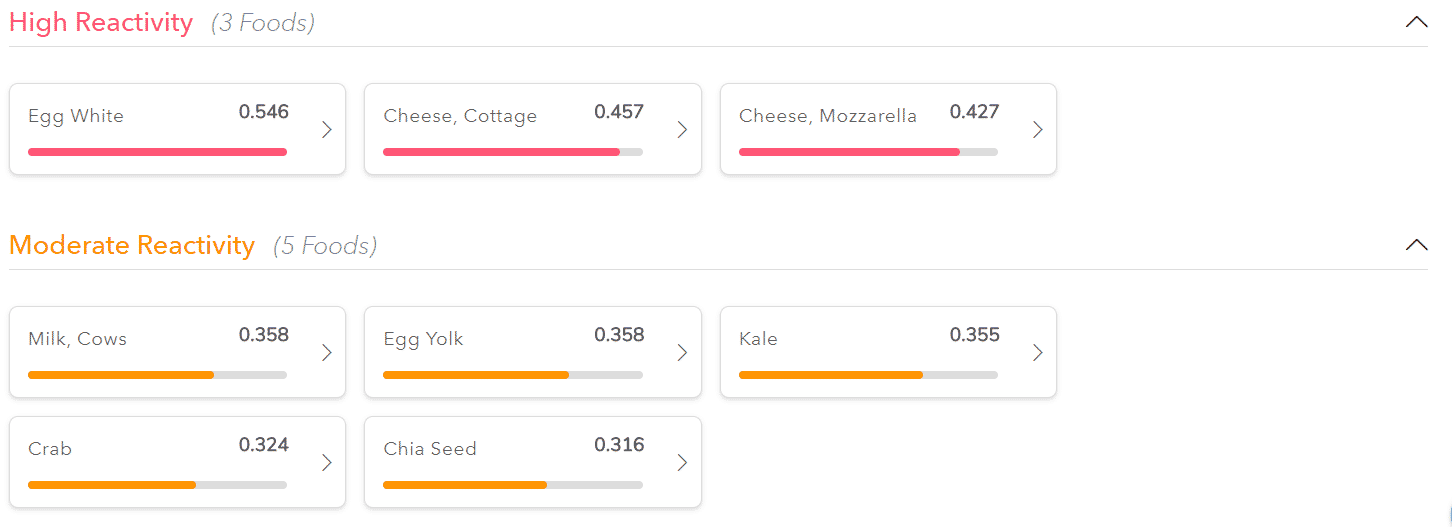
My high reactivity and moderate reactivity foods were both surprising and unsurprising. I eat a LOT of eggs and have never noticed a problem with them, but they are a common sensitivity and food sensitivity reactions can show up up to 72 hours after eating that food, so it can be difficult to trace back symptoms.
While I don’t eat cottage cheese frequently (ever?), I was not surprised to see multiple forms dairy show up in my results. I have long suspected that I have a dairy sensitivity and have been eating more cheese in recent months (#comfortfood), so this test tells me that intuition was spot on and it may be time to cut back. You can filter your results either by reactivity or by food group, and when filtering by food group I can see that I tested positive (between low to high reactivity) to every food tested in the dairy category!
…but wait, KALE? I’m reactive to KALE??! This one cracked me up. Y’all know that I am a big fan of kale whether it is a kale salad, a dinner side, or, my favorite, a side of lemony kale for breakfast. I love to incorporate this leafy green vegetable wherever possible because it packs a huge nutritional punch.I’ll share more about what I’m going to do with this information below, but know that I do eat quite a lot of kale. In fact, I enjoy it almost daily. Have I ever noticed signs of an intolerance? No, not at all. This could be a companion “sensitivity” due to the fact that I may have a slightly unwell gut due to more than normal stress and unusually little sleep (all the dairy and possibly eggs don’t help). The stress and the sleep are both related to the fact that we’re first-time parents (she’s now 5 months!), so I know this is just a season.
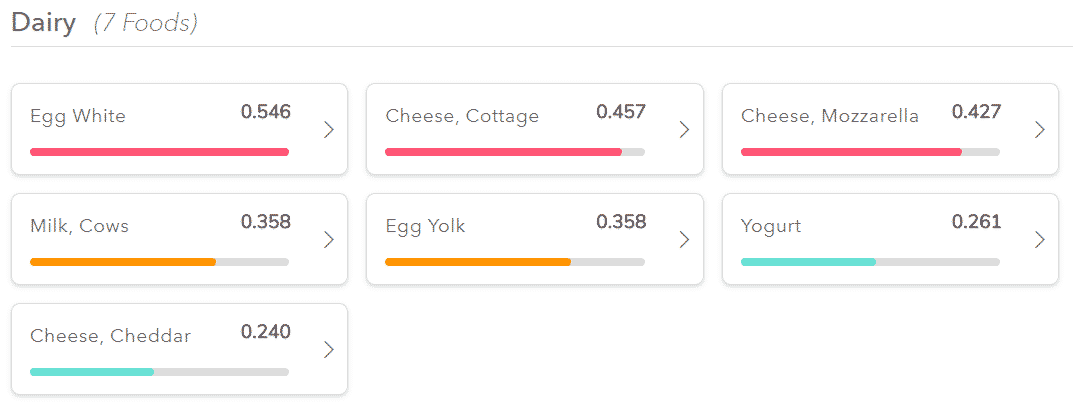
When I sent off my food sensitivity test, I was very curious to see what my sensitivity to grains would be. I’ve been incorporating a lot more grains, especially rice, into my diet without any noticeable side effects, and was pleasantly surprised to see that my test results came back with no sensitivity to grains!
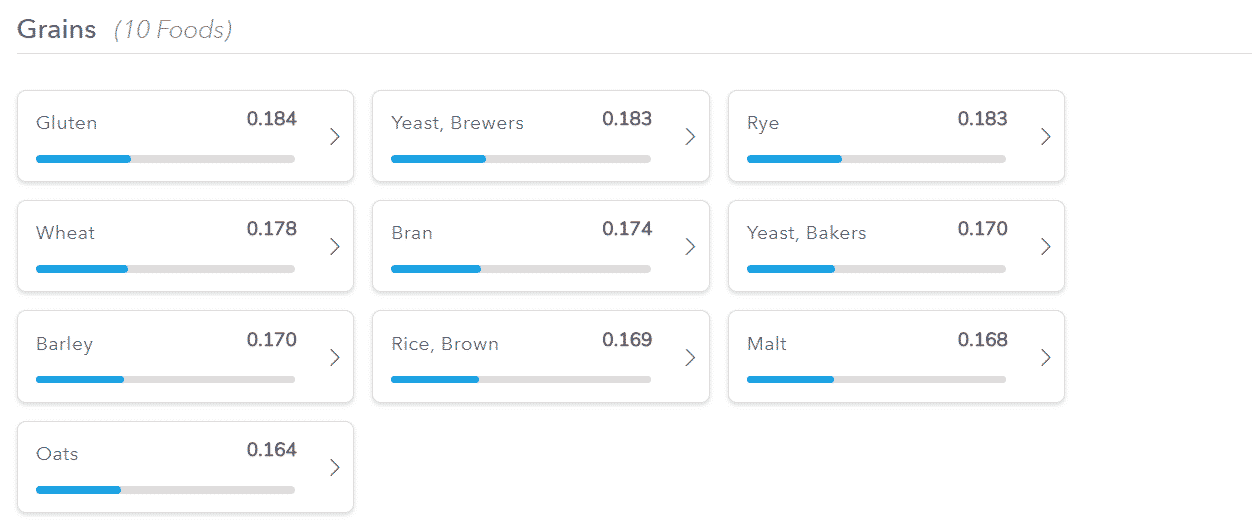
WHAT ABOUT THE GLUTENS?? I know this one can be a little confusing …so hang in there.
YES, the test reported no (or very little) reactivity to gluten or wheat. That being said, of any food I eat I know I have the WORST reaction to gluten and can always identify it quickly. So why didn’t gluten show up on my test? Because I avoid it as much as possible! If I had eaten gluten within the last few months, it would’ve been through accidental cross contamination, so my immune system is no longer actively producing those antibodies. No antibodies in my system means that it won’t show up on this test.
How I’m Approaching My Food Sensitivity Results
Though I’m personally not big into bio-hacking approaches to wellness, I REALLY appreciate these results right now. After pregnancy + life with a newborn, I wondered if my sensitivity would be as different as my new shoe size. Turns out, it’s really not. While the manifestation of my sensitivity to dairy has gone from acne-oriented to maybe contributing to fatigue, it’s still real. I was also surprised to see that eggs were on there. I hadn’t really noticed severe reactions from eggs, but, then again, I literally eat them EVERY SINGLE DAY. Time to take my own advice and take a break from this nutritional powerhouse of a protein. I’m eager to see how my body responds to a break from eggs and dairy for a bit!
As for the kale, I have zero intention of slowing down there. Like I said above, I really do not believe that this is a true sensitivity and rather one that showed up more out of coincidence of eating foods that do NOT work well with my body.
As for the other sensitivities? I have ZERO intention of avoiding the foods listed here. Again, I do not view this list as a “do not eat these foods” resource. The object of healthy living is to eat as many foods as possible, not as few. Will I still eat eggs? YES, just maybe less frequently. Will I still eat chia? Of course! Just not every day. Will I still eat kale? YOU KNOW IT. What about all the cow’s dairy? I will still put it in my coffee each morning (heavy cream), but maybe I’ll slow down on ice cream as a dessert we keep on hand and all the extra cheese I’ve been adding to random meals (like pasta). I DO still plan on enjoying cheese (and ice cream) while I’m traveling, though! How about crab? I don’t eat a lot of crab, but you can bet that if it’s on a lovely looking Nicoise salad, I’ll be digging right in. After I enjoy meals that contain foods that show up on this test, I won’t feel impending doom …nope, I will be inquisitive and pay attention. I’ll tune in and see if I’m feeling a little more lethargic after that crab or ice cream. It’ll be so interesting!
So, in summary, I plan to reduce most of these foods from my DAILY intake routine (except kale), but do still plan on enjoying them occasionally …without guilt or feeling of restriction.
Lastly, I just want to say that my experience with EverlyWell has been truly OUTSTANDING. I want to recommend this test to everyone. I feel that the process was easy and the information was empowering. I believe that the results were accurate and also know that they can be confusing without some understanding (like we have in this post) of what they really mean. It’s a great price point and think these tests would make a fabulous gift for a loved one!
Other tests…
EverlyWell also offers the following tests:
- Metabolism Test
- Thyroid Test
- Men’s Health Test
- Women’s Health & Fertility Test
- Vitamin D & Inflammation Test
- Cholesterol and Lipid Test
- Heavy Metals Test
- Sleep & Stress Test
I’m really curious about the fertility test, the thyroid test, heavy metals, inflammation, and stress tests!
If you’re experiencing some of the symptoms listed above and don’t quite know where to turn next, I HIGHLY encourage you consider this Food Sensitivity Test. Knowledge is power and having a very good idea of what your individual body is reacting to (right now) will empower you to make the best-for-you food choices. If you’re interested in any of EverlyWell’s testing, Use code “FED” for 15% off any EverlyWell test!

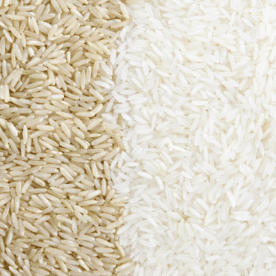
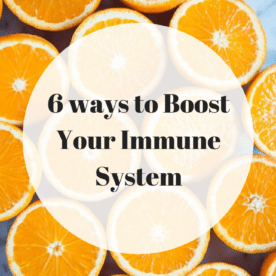













I have tasted done l need know what’s the result
Did you see any changes after you eliminated any of the food?
It’s been a couple of years since this post. May we have an update on your diet and symptoms?
I am waiting for myFood sensitive comprehensive test results. Just wondering why the results are still in process it’s been 8 days: please let me know thank you Sherri Millett Email Sherri.millett@ sbcglobal.net
Hi Sherri! Your best bet is contacting Everywell to see what the hold up is!
I’m just not sure why you’d bother to do this test, if you rationalize away all of the findings. You basically said it was ineffectual (detecting gluten), you don’t believe it’s correct (kale) and you’re going to ignore the rest of it (dairy and eggs). Seriously, why would you even recommend something you obviously don’t believe in as a product?
While we don’t think that this test is the end-all-be-all, it’s definitely a great starting point if you’re noticing any symptoms that could be related to what you’re eating. This helped Cassy to make informed decisions in regard to certain foods!
You read my mind Brooke Perry!
I got similar results—egg whites and cow’s milk were my top two sensitivities. I’m also in the newborn stage with my first son, and I know how important choline is to a breastfeeding mama and baby, so eggs are staying in my diet for the time being! The dairy might have to go though. 😉
I was very pleased with this test, but bummed that it didn’t include goat or sheep’s milk! I love a good manchego or goat milk yogurt, and I was curious to know if I was reacting at all to these. Oh well!
IgG antibodies are the wrong antibodies to look for. IgG antibodies measure exposure to a given food, not an allergic response to it.
It’s true that your body makes IgG antibodies against the foods you eat. But those IgG antibodies aren’t involved in the food allergy response: they don’t release histamine, they don’t cause anaphylaxis, and (as far as anyone can tell, at least), they don’t cause any other actual allergic responses. They aren’t consistently associated with any chronic food allergy symptoms. Plenty of healthy people with no allergy symptoms test positive for IgG antibodies to all kinds of foods. And some people with life-threatening allergy symptoms test negative on IgG tests for that food.
Hi Christine, thank you for that feedback! In our original article we do differentiate between Food Allergies and Food Sensitivities (what we’re talking about here) and you are correct that the IgG antibodies don’t cause anaphylaxis and other allergy symptoms, but they can cause other problems. You can read more here: https://fedandfit.com/food-sensitivity-testing/
Has Austin tried the testosterone or Men’s Health kit? I would be curious to get his view on it.
Cassy, I’m curious about your thoughts about doing this type of testing on a toddler-aged child. My daughter will be two next month and she had a test ordered a couple months ago by her Ped that measures IgG, IgG4, IgE, and Cd4 (complement). I know my daughter’s test was a little more exhaustive than the Everlywell test, but I find myself overwhelmed trying to help my little girl feel her best while still giving her healthy food. For example, she had moderate results for avocado, but she loves avocado. There aren’t many foods she will eat (she still prefers breast milk), and now I’m not sure if I’m supposed to take away the foods she tested moderately positive for. I’m just curious about your thoughts as to whether your approach (with your kale example) is something I could/should do with my daughter. She can’t tell me yet if she feels anything weird when she eats things, so it makes me nervous to keep giving her something when I just don’t know what’s really happening. I appreciate any feedback you have! Thanks!
Hey Cassy-
Thanks for the post, after listening to your podcast, I purchased this test and got a result of high reactivity to two foods, brewers yeast the highest then bakers yeast.
I’ve been working in gut health now for about 6 months, I understand the other results I got and the results you received, but the test mentioned if you have bost yeasts as high reactivity you’re not sensitive to them but something else is going on.
I was kind of saddened by the results because now I’m not sure what I am supposed to do lol! I would have preferred your straightforward results.
Any ideas?
Thank you!
Chelsea
I loved this post! I’m going through the same thing right now. I also reacted horribly to eggs and all dairy. My saddest were almonds and blueberries but maybe I’ll follow your lead on the kale idea and still enjoy some summer blueberries. Thank you so much for posting this!!
Hi there!
Just curious if I am currently gluten free but want to see if I have an intolerance, should I eat gluten before taking this test??
Thanks,
Hannah
Hi Hannah! EverlyWell recommends eating any eliminated food that you want to test for 4 weeks before the test so your immune system has time to respond properly. If you experience symptoms while eating gluten, you’ve already identified a sensitivity.
I had to do a food intolerance test as prescribed from my Naturopath. Egg Whites came back for me too! I was sad because I was like ummm I love eggs! Now what! Dairy was also high and Almonds were borderline. I’m noticing the effects now that i’ve cut them out and had them in various things. Ex: Homemade Mayo gets me now and I notice it!
Thanks for posting and sharing!
I actually read something recently that said about half of people have an adverse inflammatory reaction to kale! Might be worth doing a little research (sorry I can’t remembee where I saw it but it may have tied into fodmaps somehow??)
That’s so interesting, thanks for the info Becky!
Your 15% off code didn’t work for me 🙁